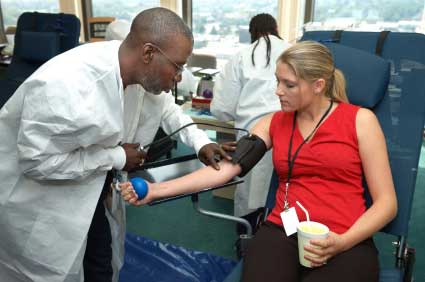Introduction
Even though you've accepted your diagnosis of diabetes, and you're now familiar with your diet, your need for medication, careful monitoring of your blood sugar levels and the need for insulin injections, you must still be able to cope with long-term management of your diabetic condition. Individuals diagnosed with the disease should realize that emotional factors might help or hinder your diabetic condition. This article will focus on how emotions such as stress and depression may interfere with your long-term health and wellness and the link between diabetes management and your emotional outlook.
Coping with Diabetes
It's not easy to cope with a long-term medical condition, especially when management factors can interfere with lifestyle, diet, and habits. A teenager or a middle-aged adult who must suddenly alter her diet and watch what she eats while others around her at the family dinner table eat what they want can be extremely frustrating.
A young man with diabetes may find it aggravating that he's got to carefully monitor his blood glucose levels in the middle of a football game, or has to find a way to transport his chilled insulin on his rock climbing adventures.
Coping with diabetes goes way beyond following a daily menu plan, ensuring that you have adequate supplies on hand, and monitoring your blood glucose levels. Coping with the disease means learning how to travel and still manage your condition and finding the best methods for making changes in lifelong habits or lifestyles. Failure to do so may trigger serious repercussions on your emotional and mental outlook.
There will be days, even though you're doing everything right when it comes to managing your condition, that you'll feel lousy. At times, your blood sugar levels will erratically rise and fall with no particular reason. No doubt about it, managing diabetes is very time-consuming and can be overwhelming to some individuals.
For this reason, it's often suggested that newly diagnosed diabetics, or even those who have been living with a condition for a while, seek the professional help and support of mental health counselors such as a psychologist. Support groups are also very beneficial and help you engage in constructive complaints, frustrations and feelings regarding your condition with others who know what it's like.
While family members of diabetics are often extremely supportive and understanding, there's nothing quite like sharing your feelings and emotions with others going through the same process as you are. Seriously consider the importance of gathering with other diabetics. Doing so will reinforce the knowledge that you're not alone, that others are going through the same frustrations and lifestyle changes as you are, and are there to offer compassion, understanding, and support.
Diabetic conditions may cause erratic mood swings and emotional roller coaster rides. Such emotions may be more severe for middle-aged or older adults who have spent a lifetime accumulating habits and who have settled into a specific lifestyle. It's difficult to adapt to new circumstances, situations and demands on your health and wellness at a later age, and these requirements are often stressful and depressing.
Diabetes and Emotional Roller Coasters
Non-stable blood glucose levels have a direct impact on hormones and stress, and can create a never-ending and quite vicious cycle of emotional roller-coaster rides that affect not only the diabetic, but loved ones, extended family members, coworkers and friends.
In some cases, a diagnosis of diabetes can be devastating to some individuals. Some accept they have a medical condition and are proactive and open about managing the disease, while others go through what can literally be termed as a grieving process and deny they have a medical condition at all. Some individuals refuse to believe that they have a problem, despite the attempts of loved ones to get them to see that ignoring the problem or refusing treatment can result in long-term consequences.
If you've recently been diagnosed with diabetes, or know someone who has, encourage them to follow their doctor's orders whether they've had a chance to research their condition, accept it, or acknowledge that they have a medical condition at all. Denial is a common human emotion, and sooner or later, most people accept the diagnosis and take steps to manage their condition, whether they like it are not.
Every individual will react to the diagnosis in a different way. However, it's up to friends and loved ones to realize that those who refuse to accept their diagnoses may very well be placing their lives in danger if their blood sugar levels take erratic dips. Emergency room visits and long-term physical or brain damage, blindness and other very serious complications may result from refusal to accept treatment.
Individuals diagnosed with diabetes may experience erratic emotional mood swings. Stress and depression can actually perpetuate a rise in blood glucose levels that in turn create difficulty getting blood sugar levels under control. The more blood glucose levels are out of control, the more often the individual may feel symptoms such as weakness, dizziness, shakiness, irritability and increasing frustration and despondence.
Diabetes and Depression
According to recent studies, nearly 20% of individuals diagnosed with diabetes are currently or have experienced depression associated with the condition that required therapy and/or anti-depressant medication. Some of the most common symptoms of depression in adults include:
- Sleep disturbances - a person can sleep too much or experience insomnia
- Irritability and agitation
- Weight loss or weight gain
- Lack of concentration
- Feelings or expressing a sense of worthlessness
- Serious depression may contribute to thoughts of suicide or death
This is another reason why individuals who have been diagnosed with chronic conditions such as diabetes should be aware of the benefits of talking to counselors or psychologists or other mental health professionals or support groups in order to seek information and knowledge regarding the condition and to express feelings and fears.
You will have good days and bad days, and accepting that may help provide long-term emotional management tools and methods suited to your situation, personality and environment. Regardless, one thing is common in an approach to depression, suggested by doctors, therapists, and professional health care providers and support groups - exercise.
Exercise doesn't mean you have to have a gym membership, work out with weights, or join classes. Go for a walk. A simple walk every day can do wonders for not only your overall physical health and wellness, but also your emotional and mental outlook on life. Exercise stimulates production of hormones in the brain called endorphins, which are the body's natural "feel good" hormones, flooding the body with a sense of well-being following moderate exercise. A 45-minute walk every day in your favor location, with your dog, with a friend a family member or by yourself will help lift your mood and will often offer you the best opportunity to think, consider alternative ideas for managing diabetes or changing lifestyle, or get your mind off your condition all together.
-
Managing Stress
Managing stress isn't easy for anyone, regardless of situation, medical condition or circumstance. Managing stress when you have diabetes can be challenging, but it's important for your long-term health and well-being. A brief explanation of how stress affects the body will help you understand the importance of managing stress, whether you have diabetes or not.
When you're feeling stressed, certain actions and reactions take place in the body. The adrenal glands, located on the top of your kidneys, release a hormone called cortisol. The hormone is responsible for the bodies automatic "fight or flight" reaction to anything that we perceive may be dangerous or life threatening. This fight or flight response is inbred in every human being and is what helped keep our prehistoric ancestors and generations of hunters, gathers and warriors alive through thousands of years of fighting for survival.
The production and release of cortisol by the adrenal glands triggers the liver to increase glucose production. This excess production of glucose will supply the body's muscles and nervous system with the energy to react appropriately - we freeze in place or we prepare to fight or run. As the liver increases this production of glucose, the brain also signals muscle tissues and fat stored in the body to reduce their uptake of energy stores. Your blood pressure increases, eliciting a release of fatty acids from fat tissues in the body needed for immediate fuel for the muscles.
The release of cortisol by the adrenal glands also releases a chemical in the body called epinephrine, often called an "adrenaline rush" that gives our bodies a brief burst of strength, power and endurance designed to help us escape from danger situations.
As levels of cortisol and epinephrine increase, the body goes into a mode that promotes insulin resistance while it the same time, blood glucose levels continue to increase. These chronic or long-term spikes in both blood pressure and blood glucose levels can wreak havoc on your body, especially under chronic conditions. Individuals undergoing periods of stress in their lives should test their blood glucose levels more frequently.
Conclusion
As you can see, the link between emotions such a stress and depression may have a direct and serious impact on your ability to manage your diabetes. A diabetic diagnosis alone is enough to trigger stress and depression in many individuals, as well as emotions such as anger, resentment, and a sense of unfairness. Seeking out the support of friends, family and loved ones as well as medical professionals may help you get through rough periods. Such support also benefits not only your understanding of your body's own reaction to emotions, but also how you can change your lifestyle or your approaches to certain situations and events that will reduce your chances of diabetic complications.
Diabetes Prevention
Introduction
Can you prevent diabetes? In some cases, the answer is yes. This section focuses on preventing diabetes and what you can do to help yourself, your children or your parents avoid a diabetic diagnosis. In some cases, diabetes is a genetic and often inherited condition, but in other situations, lifestyle, dietary habits and lack of exercise can lead to contributing factors that result in a person being diagnosed with the condition.
Tips for Preventing Diabetes
One of the best things you can do to help prevent a diabetic diagnosis is to exercise. Exercising on a daily basis helps manage weight and prevents you from gaining excess weight that often contributes to a diabetic diagnosis. The Mayo Clinic suggests 30 minutes of exercise every day. You can accomplish this through a daily walk, or by riding your bike or engaging in other activities that you enjoy.
That's the key to exercise - doing something that you enjoy. If you don't like swimming, then don't force yourself to swim. If you like hiking, tennis, rock climbing, ice-skating, cross-country skiing or gymnastics, indulge! However, before starting any physical activity or endeavor, especially if you're not used to exercise, or you've been newly diagnosed with diabetes, talk to your doctor about properly monitoring your blood glucose levels when you start exercising until you understand how your body reacts to it.
Exercise also helps you maintain a healthy weight. Again according to the Mayo Clinic, even losing a small amount of weight, for example between 5 and 10 pounds, can help reduce your risk of developing diabetes.
In addition to exercising, try altering your diet so that you're eating foods lower in calories and fat content. While some of us are not terribly fond of vegetables and fruits, you can start eliminating some of the high sugar and high fat foods that you eat on a weekly basis.
Take this aspect of your lifestyle change step by step and don't try to "cold turkey" an entire lifestyle change all at once. For example, if you're used to driving through the fast food parking lot every day at lunch, start curtailing your visits to three to four times a week. Gradually increase the duration between visits, and sooner than you realize, you won't crave those fatty foods or French fries anymore.
Your lifestyle habits, dietary habits, and exercise levels may need to be adapted severely or only a little bit, depending on your current situation. However, you can take 10 simple steps to help prevent diabetes in your life, or the life of a loved one.
- Talk to your doctor about your current risk for diabetes or pre-diabetic condition.
- Start exercising for 15 to 20 minutes every day this week. Next week, add 5 or 10 minutes to that time. Try to work up to a minimum of 30 minutes of moderate activity or exercise on a daily basis.
- Be prepared for some backsliding. It's hard to make lifestyle changes and develop new habits. Stick with it. It commonly takes individuals about 21 days to establish a new habit or lifestyle change.
- Eat better. Try to get between 5 and 9 servings of fruits, vegetables and grains on a daily basis.
- Gradually reduce fat in your diet. Opt for grilled or baked instead of fried whenever possible.
- Watch your weight. Individuals who are overweight or obese are at an increased risk of developing diabetes.
- Be aware of your family history. If one or more family member has been diagnosed with the disease, you may be at an increased risk of also developing diabetes.
- Monitor your blood pressure on a regular basis. Over 70% of adults diagnosed with diabetes have also been diagnosed with high blood pressure.
- Limit portion sizes. This also helps with weight maintenance.
- Reduce your intake of sodium or salt in your daily diet.
Conclusion
Save your health as well as potentially thousands of dollars in medical supplies, doctor's visits and treatments for diabetes by taking steps to prevent the disease from developing in the first place. A proper diet and adequate amounts of exercise may be all you need to avoid a diabetes diagnosis. Educate your children, friends and family members regarding diabetes and understand the basics of what it is and how it affects the body.






























